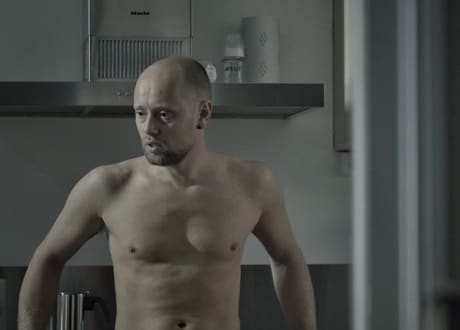As presented, 90 Minutes structures its unflinching examination of domestic violence as an analysis of perspective. When the three central storylines are introduced, they are context-free, merely existing as flash moments into the lives of anonymous people.
Businessman Johan (Bjørn Floberg) runs errands, while policeman Fred (Mads Ousdal) calmly eats a yogurt and a woman – later revealed as his ex-wife – storms around the kitchen, perturbed for an unspecified reason. More distressing is the third storyline, where the half-naked Trond (Aksel Hennie) wraps his hand and watches a quiz show about Ridley Scott movies.
Impeccably shot, with long, static takes of these separate characters merely living in real time, we're left scrambling to assemble a meaning from the images. But just as confusion sets in, sophomore director Eva Sørhaug revisits each storyline to give us a second perspective on each event, with Fred behaving passive-aggressively towards his ex-wife and Trond angrily dealing with a newborn while a bruised woman lays tied up in his bed.
This elliptical style continues throughout the film, with each storyline progressing at a glacial pace with an increasing sense of dread and urgency. The consistent thematic thread is that of domestic abuse, but it's mixed with imagery of mass, faceless crowds, suggesting that these disturbing tales of repressed rage and impending violence are seething beneath the surface more commonly than we might imagine.
While this refusal to adhere to a traditionalist narrative or provide audience catharsis and reassurance aids in packing the desired sensory punch (no pun intended), Sørhaug's commitment to unflinching realism is a challenge in itself. All three storylines have their own brand of distress, but in the Trond narrative, his repeat graphic beating of his wife, smashing her face into a pulp while raping her, is beyond gratuitous. Yes, it is intentional, so as to scare some reality into the audience, but knowing this doesn't make it any easier to digest or witness.
Still, the deliberate and intense nature of this powerful outcry is difficult to ignore, leaving us with something to consider when making small talk with our seemingly well-adjusted and content neighbours.
(4 ½ Fiksjon)Businessman Johan (Bjørn Floberg) runs errands, while policeman Fred (Mads Ousdal) calmly eats a yogurt and a woman – later revealed as his ex-wife – storms around the kitchen, perturbed for an unspecified reason. More distressing is the third storyline, where the half-naked Trond (Aksel Hennie) wraps his hand and watches a quiz show about Ridley Scott movies.
Impeccably shot, with long, static takes of these separate characters merely living in real time, we're left scrambling to assemble a meaning from the images. But just as confusion sets in, sophomore director Eva Sørhaug revisits each storyline to give us a second perspective on each event, with Fred behaving passive-aggressively towards his ex-wife and Trond angrily dealing with a newborn while a bruised woman lays tied up in his bed.
This elliptical style continues throughout the film, with each storyline progressing at a glacial pace with an increasing sense of dread and urgency. The consistent thematic thread is that of domestic abuse, but it's mixed with imagery of mass, faceless crowds, suggesting that these disturbing tales of repressed rage and impending violence are seething beneath the surface more commonly than we might imagine.
While this refusal to adhere to a traditionalist narrative or provide audience catharsis and reassurance aids in packing the desired sensory punch (no pun intended), Sørhaug's commitment to unflinching realism is a challenge in itself. All three storylines have their own brand of distress, but in the Trond narrative, his repeat graphic beating of his wife, smashing her face into a pulp while raping her, is beyond gratuitous. Yes, it is intentional, so as to scare some reality into the audience, but knowing this doesn't make it any easier to digest or witness.
Still, the deliberate and intense nature of this powerful outcry is difficult to ignore, leaving us with something to consider when making small talk with our seemingly well-adjusted and content neighbours.
